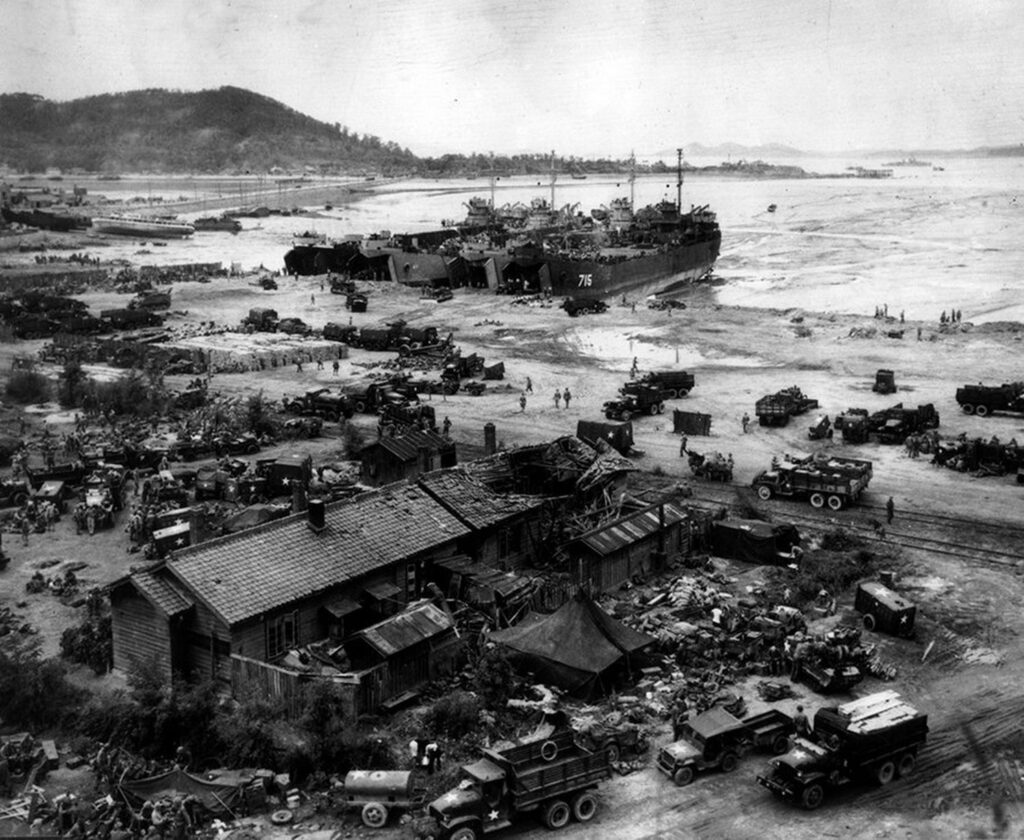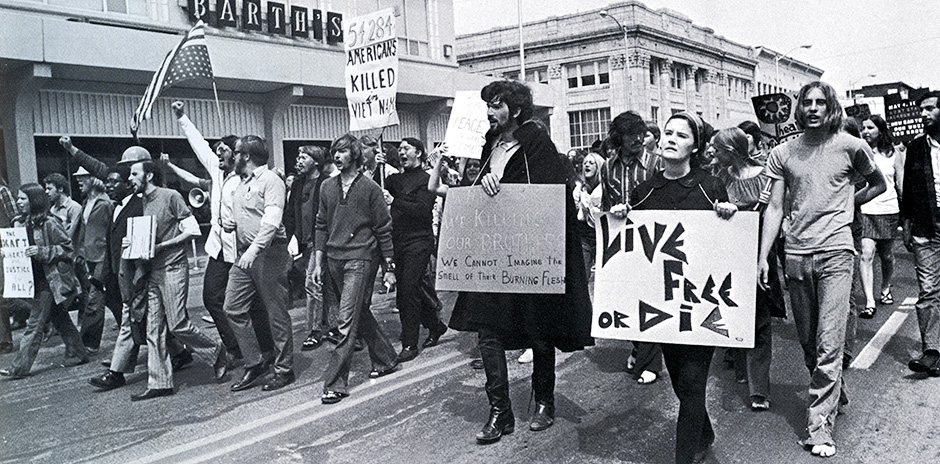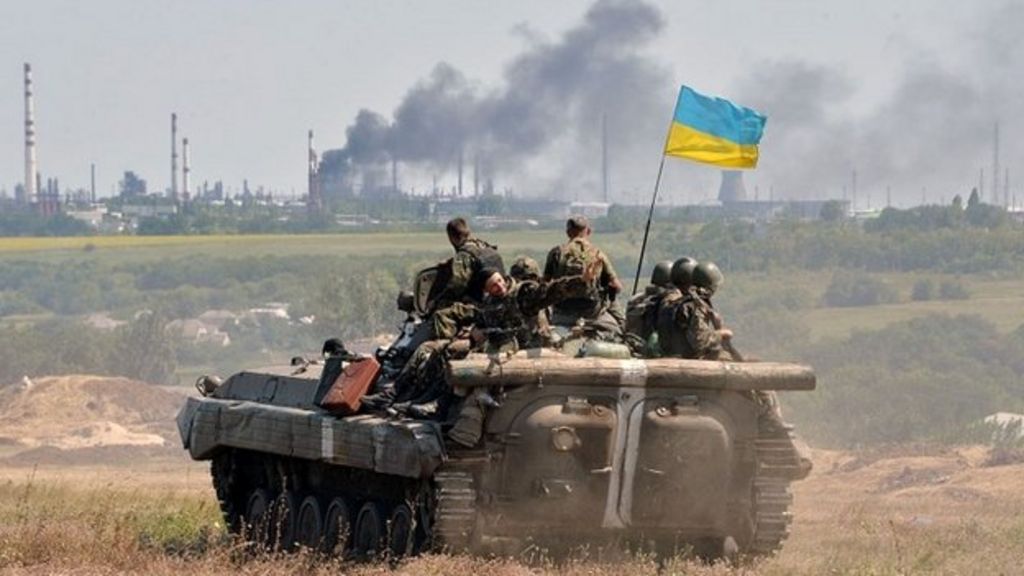News reports from World War II:
‘France. July 14, 1944. The grand Allied invasion of Europe is hopelessly bogged down in the Cherbourg Peninsula, dimming the hopes raised by the successful landings of June 6th. Repeated Allied attempts to break out of the peninsula have failed. Directed by Field Marshall Erwin Rommel, German defensive deployments and counter-attacks, featuring vicious fighting among the ancient Normandy hedgerows, have produced appalling casualties. The Normandy beachhead is now a densely packed killing ground which threatens to destroy the entire Allied invasion force. In off-the-record interviews, Allied High Command staff officers have raised fears of a World War I-style “quagmire.”
‘Stateside, student demonstrations against the war and the draft are occurring. Republicans have denounced Franklin Roosevelt’s leadership of the war and called for withdrawal of our forces. A retired general says the European invasion was “the wrong war at the wrong time.” He argues that Hitler was not a direct threat to American interests and would have “self-destructed in due time” without our direct intervention. The European war is expected to be a major issue in the coming (1944) presidential election. Political experts expect FDR to be defeated and American policy to take a new direction.’
‘Belgium. December 20, 1944. Bursting out of the Ardennes Forest on December 16, as they did in May 1940, the German Wehrmacht drove a thirty-mile wedge into the Allied line with a massive Panzer offensive. Falling back in disarray, several American battalions were overrun by triumphant German forces. The 101st Airborne Division is completely surrounded and cut off at Bastogne. Its surrender is anticipated imminently.
‘Republican leaders are demanding General Eisenhower’s removal from command of Allied forces in Europe. The unexpected German success has produced renewed calls for a negotiated peace and withdrawal of all American troops from Europe. Republicans who say Mr. Roosevelt lied about the Allied military situation in order to get re-elected are now calling for his impeachment…’

These “reports” are fictional, of course, although the military situations were true. Indeed, allied forces were stuck just inland from the Normandy landing areas throughout June and much of July, 1944. Fighting through the impenetrable hedgerows of Normandy was murderous going – expensive in both casualties and time. Although Field Marshal Erwin Rommel was not in Normandy at the exact moment of the invasion, he organized a robust defensive deployment in the following weeks. The Allies spent six very tough weeks fighting their way out of Normandy.
On December 16, 1944 Germany launched a massive counter-offensive through the Ardennes against a weak sector of the Allied line in Belgium. The surprise attack became known as the Battle of the Bulge. Allied high command was caught off guard. Some American units were overrun, and companies of the 101st Airborne division were surrounded by German forces at Bastogne. German demands for surrender of American forces received a surly one-word reply: “Nuts.” Under heavy artillery fire the 101st held out until relieved by General Patton’s Third Army on December 26, 1944.
By mid-January 1945 the Allies had regained most of the ground captured by the German offensive. 25-year-old PFC Eugene Zimmerman (my father) – then serving with the Fourth Division in Belgium – later described mile upon mile of German vehicles abandoned along the Belgian roads after the Bulge. Pop said a German muttered, “Nichts Benzin,” as he passed by. The German offensive had run out of gas.
Allusions to political and media events in these “reports,” however, are fanciful. No such reports were filed in 1944. The news media didn’t criticize the war or its management. Casualty figures were not generally published. When they were, the data usually understated reality. Reporters probably knew this, but did not object.
Military authorities managed news-reports of military actions for their effect upon civilian morale. Although many reporters landed with military units at Normandy, Italy, North Africa and the Pacific islands, they were not free to file reports which military censors considered harmful to the overall war effort. Grisly footage and photos of dead and wounded soldiers that we now see on the History Channel were kept from the American public until after the war was won. Today’s style of war reportage was unknown during WWII.
Republicans also studiously avoided criticism of FDR’s management of the war and our troops’ progress. During the 1944 election campaign, when Republicans might have made the war an issue, they said nothing about it. Republican John W. Bricker of Ohio ran against FDR, but his pro-forma campaign merely twitted FDR for seeking an unprecedented fourth term. Republicans evidently did not think changing leadership in mid-war was a good idea.
In past articles I have suggested that we might have trouble defeating our skilled and ruthless World War II opponents in the current media and political climate. The trust and freedom of action given to Mr. Roosevelt by the American people in general, and by his political opponents, in particular, could not be replicated today. Nor would today’s media tolerate the military management of news that was standard practice from 1941 to 1945.
What happened between 1945 and the present that so affected our ability to wage war? A book could hardly suffice to answer the question thoroughly, but some key aspects can be noted here.
Democrats’ wars.
All four of our significant wars in the twentieth century occurred during Democratic administrations. (Young people would not learn this from current reporting.) Observing long tradition, Republicans were the Loyal Opposition during each war, and all politics ended at the water’s edge. No Democratic president ever had to contend with Republican opposition to its war policies. Presidents Woodrow Wilson, Franklin Roosevelt, and Harry Truman had complete freedom to fight their respective wars. Lyndon Johnson didn’t ask Congress to declare war on North Vietnam in 1965, but he took us into war anyway. His party controlled both houses of Congress, so they raised no objection. But they should have.

Vietnam.
After LBJ involved us in Vietnam, political opposition to the war began to grow, reaching a crescendo after North Vietnam’s Tet Offensive in early 1968. But the opposition came not from Republicans but from the burgeoning anti-war wing of Mr. Johnson’s own party, led by Senator Robert F. Kennedy. Reading the handwriting on the wall, LBJ announced in March 1968 that he would not seek re-election. By June, Senator Kennedy had mounted a formidable drive for the Democrat nomination, but he was assassinated on the night of his win in the California primary.
In the election campaign that followed, both Hubert Humphrey and Richard Nixon supported the war and promised to conclude hostilities with all deliberate speed. The winner, Mr. Nixon, took four years to keep his promise. Peace with North Vietnam was concluded in December 1972, shortly after Mr. Nixon decisively defeated peace-candidate George McGovern.
As peace-protests grew during Mr. Nixon’s first term, Vietnam became Nixon’s War. How we got into it was conveniently forgotten by media and Democrats. Already hated by leftists for his anti-communism activities1 of the 1940s and ‘50s, Richard Nixon became the primary target for Democrats and Big Media, who joined student protestors in opposing both the war and the president. Although Mr. Nixon’s final destruction was ostensibly caused by the Watergate cover-up, its true driving force was decades of festering leftist hatred.

The Peacenik-Party.
The post-Nixon Democratic Party (not including the Scoop Jackson wing) gradually solidified into the anti-war party – particularly when a Republican was president. Democrats and the news media worked themselves into a frenzy when Ronald Reagan announced the Strategic Defense Initiative (a.k.a. Star Wars) for building a ballistic missile shield. And thousands marched in anti-nuke demonstrations when Mr. Reagan placed missiles in Europe to counter a Soviet threat. Friends in Switzerland (whom we visited in 1987) considered Mr. Reagan far more dangerous than Mr. Gorbachev. They thought our “cowboy president” might pull the nuclear trigger.
Jimmy Carter and Bill Clinton got passes on war-making (although Mr. Carter didn’t really need one). Mr. Clinton quieted the peaceniks by using military actions only as “diversions” from his political (and behavioral) problems. Anti-war passions erupted during the first Gulf War, but George Bush-41 wrapped things up quickly – some said too quickly – thus stopping the protests.
George W’s full blown War on Terrorism – in response to the unprecedented attacks on American soil of September 11, 2001 – revealed how much control the anti-war wing had gained over the Democratic Party. The new Democratic National Chairman, Howard Dean, ran as the anti-war candidate in the Democratic primary of 2004. Senator John Kerry defeated him, and President Bush won the general election. But by 2006 war-weariness had affected enough voters to give Democrats control of both houses of Congress.
For peacenik-Democrats, politics no longer stops at the water’s edge. The Gentlemen’s Agreement enjoyed by Democratic presidents during their 20th century wars is gone; the Loyal Opposition role is kaput. Democrats called Mr. Bush-43 a “liar,” denounced his conduct of the war, slandered his advisors and cabinet officers, and demanded withdrawal of our troops. This encouraged our enemies to think they could win just by hanging on until the American public chose new political leadership. Voters finally did that in 2008, when they elected Barack Obama.
Media Alignment.
Claiming “neutrality” with respect to who would win the war on terrorism, major news organs opposed our military actions and ran stories clearly intended to degrade public morale and harm our war effort. The media of 1944 would never have published anything like the fictional “reports” presented above, but today such reporting is almost routine. Big Media agonized for months over minor prisoner abuse at Abu Grahib and Guantanamo, while all but ignoring Islamothugs’ televised beheadings and murders of women.
This says something important about our contemporary American media. Along with Democrats, they seemed entirely willing to see us lose the war on terrorism, if that would hurt Republicans politically. They did everything possible to make that happen. But once Democrats gained political control, the game changed again.
The Party of War, Then Peace, Then War…
With the country reeling from Joe Biden’s disastrous economy, out-of-control crime levels, social-upheaval, and wide-open borders, Democrats and their media allies have enthusiastically applauded our participation in a proxy war against Russia, on the side of Ukraine. A child could see that our involvement is being used as a political tool to salvage the Biden presidency.
Warnings that our aid to Ukraine might lead to a direct confrontation with Russia are breezily brushed aside by still wet-behind-the-ears media youngsters who seem to think that a nuclear war would be no big deal. They also say a sometimes befuddled, 80-year-old president with his finger quivering near the nuclear trigger is nothing to be concerned about. (After all, Good Old peace-loving Joe is all about restoring “normalcy.” Right?)
So now the Democrats and their media acolytes have magically morphed back into the party of war. And should Republicans regain power, Dems will doubtless become the peacenik-party once again; and then the war-party, if they re-take the reins; etc., etc., etc. Who are these guys, really?
“A double-minded man is unstable in all his ways.” (James 1:8)

*********
- Representative Richard M. Nixon served as a member of the House Un-American Activities Committee, which looked for (and revealed) Communists serving in various arms of the federal government.

